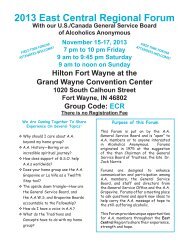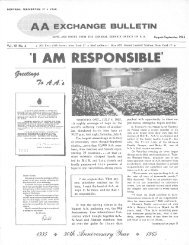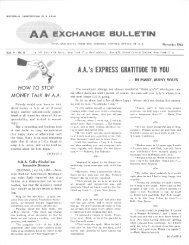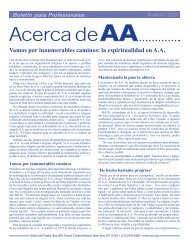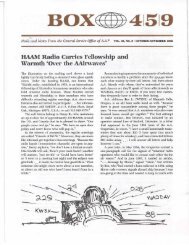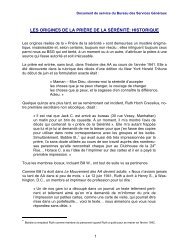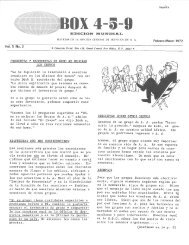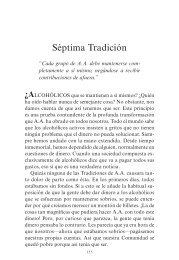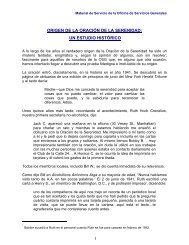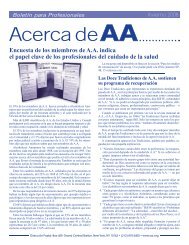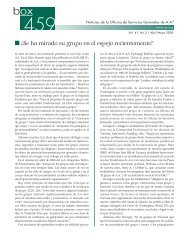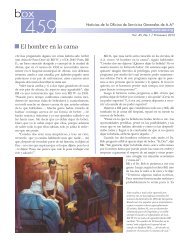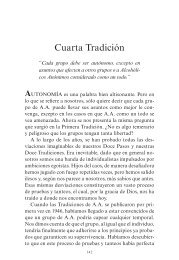Three Talks to Medical Societies by Bill W - Alcoholics Anonymous
Three Talks to Medical Societies by Bill W - Alcoholics Anonymous
Three Talks to Medical Societies by Bill W - Alcoholics Anonymous
You also want an ePaper? Increase the reach of your titles
YUMPU automatically turns print PDFs into web optimized ePapers that Google loves.
eplied, “Ordinary religious faith isn’t enough.<br />
What I’m talking about is a transforming experience,<br />
a conversion experience, if you like. I can<br />
only recommend that you place yourself in the<br />
religious atmosphere of your own choice, that you<br />
recognize your personal hopelessness, and that<br />
you cast yourself upon whatever God you think<br />
there is. The lightning of the transforming experience<br />
of conversion may then strike you. This you<br />
must try — it is your only way out.” So spoke a<br />
great and humble physician.<br />
For the A.A.-<strong>to</strong>-be, this was a ten-strike. Science<br />
had pronounced Mr. R. virtually hopeless.<br />
Dr. Jung’s words had struck him at great depth,<br />
producing an immense deflation of his ego. Deflation<br />
at depth is <strong>to</strong>day a corners<strong>to</strong>ne principle of<br />
A.A. There in Dr. Jung’s office it was first employed<br />
in our behalf.<br />
The patient, Mr. R., chose the Oxford<br />
Group of that day as his religious association and<br />
atmosphere. Terribly chastened and almost hopeless,<br />
he began <strong>to</strong> be active with it. To his intense<br />
joy and as<strong>to</strong>nishment, the obsession <strong>to</strong> drink presently<br />
left him.<br />
Returning <strong>to</strong> America, Mr. R. came upon an<br />
old school friend of mine, a chronic alcoholic. This<br />
friend — whom we shall call Eb<strong>by</strong> — was about <strong>to</strong><br />
be committed <strong>to</strong> a state mental hospital. At this<br />
juncture another vital ingredient was added <strong>to</strong> the<br />
A.A. synthesis. Mr. R., the alcoholic, began talking<br />
<strong>to</strong> Eb<strong>by</strong>, also an alcoholic and a kindred sufferer.<br />
This made for identification at depth, a<br />
second cardinal A.A. principle. Over this bridge<br />
of identification, Mr. R. passed Dr. Jung’s verdict<br />
of how hopeless, medically and psychiatrically,<br />
most alcoholics were. He then introduced Eb<strong>by</strong><br />
<strong>to</strong> the Oxford Group, where my friend promptly<br />
sobered up.<br />
My friend Eb<strong>by</strong> well knew of my plight. I had<br />
gone the familiar course. In the summer of 1934<br />
my doc<strong>to</strong>r, William D. Silkworth, had given me<br />
up and had pronounced me hopeless. He had been<br />
obliged <strong>to</strong> tell me that I was the victim of a neurotic<br />
compulsion <strong>to</strong> drink that no amount of will<br />
power, education or treatment could check. He<br />
added that I was also the victim of a bodily<br />
derangement which might be in the nature of an<br />
allergy — a physical malfunction that virtually<br />
11



